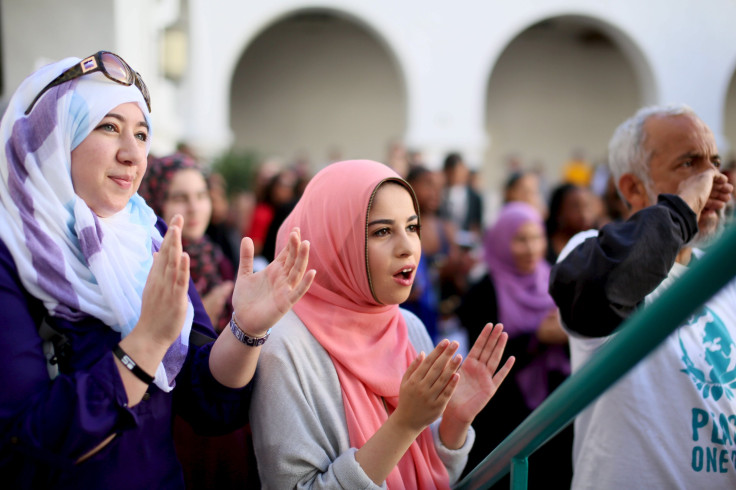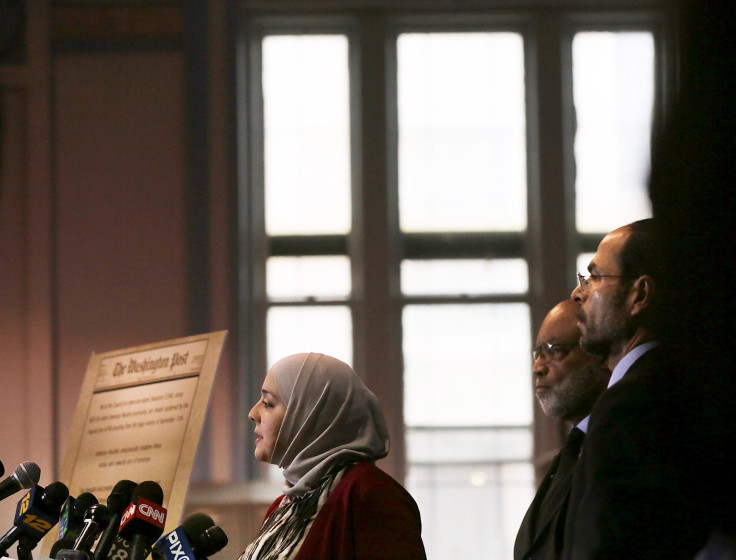What Is Islamophobia? The History And Definition Of Anti-Muslim Discrimination In The US

One consequence of Donald Trump’s fiery rhetoric against Muslims is that has renewed attention to the discrimination he espouses: Islamophobia. But what is Islamophobia, exactly?
The word has a broad meaning and often serves as an umbrella term to encapsulate negative sentiments ranging from an individual’s anti-Islam views to society-wide discrimination against Muslims. It evokes similar pejorative labels for discrimination against other groups of people, like homophobia or anti-Semitism, civil rights activists said.
"Over the years, our society has decided to use terms that are specific for when you attack a minority. Anti-Semitic, homophobic -- those are not terms most people want to be called," said Corey Saylor, head of the Department to Monitor and Combat Islamophobia at the Council on American-Islamic Relations (CAIR), a Muslim civil rights and advocacy organization based in Washington, D.C.
The history and definition of the term Islamophobia can vary, depending on whom you ask. According to the Center for Race & Gender at the University of California, Berkeley, the term emerged in 1991 in a report that defined it as "unfounded hostility towards Muslims and therefore fear or dislike of all or most Muslims."
"It helps to describe a whole spectrum of behavior and attitudes that have existed a long time but haven’t had a name before," said Peter Gottschalk, a professor of religion at Wesleyan University. Like other prejudices, Islamophobia is a learned fear, one instilled by society. "I don't think anybody's naturally afraid of Muslims and Islam," Gottschalk said.

Still, negative views of Islam are alive and well in the U.S. A poll conducted by YouGov published on Tuesday found that on average, 55 percent of those it surveyed held an "unfavorable" opinion of Islam. The same poll found that the majority of respondents also had limited contact with Muslims, with 74 percent of respondents saying they didn't work with someone who is Muslim and 68 percent saying they did not have any Muslim friends.
Trump has played to such prejudices, most recently by calling for a ban on all Muslims entering the U.S. He said that after 130 people were killed in terrorist attacks in Paris last month, the U.S. should create a database of all Muslims.
"The usage of [the term] 'Islamophobia' in the U.S. increased after the attacks of Sept. 11, 2001, but became more common during the 2008 elections and after a controversy erupted in 2010 over plans to build a mosque and community center near the site of the attacks," said Jocelyne Cesari, director of the Islam and the West program at Harvard University and the editor of the Encyclopedia of Islam in the United States.
Cesari described Islamophobia as a term used to "address the discriminations faced by Muslims that could not be explained by their race, class or immigration status" and added that the most recent wave of anti-Muslim and anti-Islam sentiments have grown out of perceived threats to security and safety.
"We have witnessed both in Europe and in the U.S. what I call an intense securitization of Islam, meaning apprehending Islamic activities in the U.S. as signs of terrorism," Cesari said. As a result, because some might see Islamophobic comments as stemming from threats to safety and security and therefore justified, making such comments could be less of a third rail than rhetoric discriminating against other minorities, Cesari suggested.
In October, an anti-Muslim group planned a series of anti-Islam protests at mosques. In January, Texas State Rep. Molly White came under criticism for saying that if Muslims visited her office, they would be asked to "renounce Islamic terrorist groups and publicly announce allegiance to America." She subsequently said she had nothing to apologize for.
Despite the recent attacks against Muslims, Saylor expressed hope that Islamophobia in the U.S. had reached a turning point and would start to subside. "It's reached a public consciousness where people are talking about it," he said. Racial slurs have gradually become socially unacceptable, he pointed out. "I think the same will happen with Islamophobia," he said.
© Copyright IBTimes 2025. All rights reserved.






















